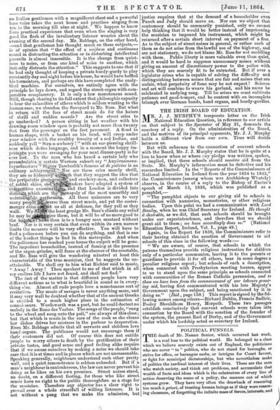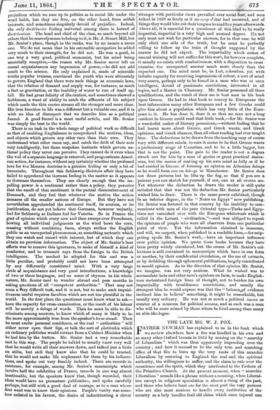POLITICAL FUNNELS.
THE death of Mr. Nassau Senior, which occurred last week, is a real loss to the political world. He belonged to a class which we believe scarcely exists out of England, the politicians who are never " in " politics, who do not stand for boroughs, or strive for office, or harangue mobs, or intrigue for Court favour, or fight for municipal dictatorships, but who nevertheless make of politics the cardinal interest of their lives. These are the men who watch society, and think out problems, and accumulate that wealth of facts and ideas which is the substratum of every line of action deserving the name of a policy, the manure out of which systems grow. They have very often the drawback of reasoning too much ic priori, of treating human beings as if they were reason- ing chessmen, of forgetting the infinite mass of forces, interests, and which we sum up in politics as in social life under the word habit, but they are free, on the other hand, from selfish interests, and sometimes singularly devoid of prejudice. Indeed, the only doctrinaire feeling universal among them is hatred of doctrinaires. The head and chief of the class, so much beyond all others that he scarcelyseems tobelong to it, is Mr. J. Stuart Mill, but Mr. Senior's place, though in the ranks, was by no means a mean one. We do not mean that in his ostensible occupation he added very much to their strength, for he did not. He was a good, in one way a very good, political economist, but his mind being essentially receptive,—the reason why Mr. Senior never left on casual acquaintances any impression of power,—he did not add much to the science. He only explained it, made of scientific truths popular truisms, convinced the youth who were ultimately to govern England that there were such things as economic laws, that the relation of demand and supply was, for instance, as much a fact as gravitation, or the inability of water to run of itself up- hill. He had great felicity of illustration, and sometimes showed a feebleness, a want of ability to catch the affluents of his subject which made the thin centre stream all the stronger and more clear. His true function in life was a different but a valuable one, and it is with no idea of disrespect that we describe him as a political funnel. A good funnel is a most useful article, and Mr. Senior was simply the best in the world.
There is no task in the whole range of political work so difficult as that of enabling Englishmen to comprehend the motives, ideas, and objects which govern any other race than their own. They understand what other races say, and catch the drift of their acts very intelligently, but those unspoken instincts which govern na- tional policy they never can perceive. They cannot do it even when the veil of a separate language is removed; and prognosticate Ameri- can action, for instance, without any certainty whether the professed love for the Monroe doctrine is a genuine feeling or only a bit of buncombe. Throughout this Schleswig-Holstein affair they have failed to apprehend the German feeling in the matter as it appears to Germans themselves. They see clearly enough that the im- pelling power is a sentiment rather than a policy, they perceive that the result of that sentiment is the partial dismemberment of Denmark, and they feel that whatever the motive the action menaces all the smaller nations of Europe. But they have not nevertheless apprehended the sentiment itself, its sources, or its justification, do not yet believe that Germans, however unjustly, feel for Schleswig as Italians feel for Venetia. So in France the gust of opinion which every now and then sweeps over Frenchmen, bowing all individual judgments as the wind bows the corn, massing without combining them, always strikes the English public as an unexpected phenomenon, as something meteoric which they can watch and record with interest, but of which they can obtain no previous information. The object of Mr. Senior's best efforts was to remove this ignorance, to make of himself a kind of conductor, and to transmit rays from the foreign to the British intelligence. The method he adopted for this end was a little peculiar, and probably could not have been attempted by any differently constituted mind. With a very large circle id acquaintance and very good introductions, a knowledge of two or three languages, and no sense of shyness in his whole seem a very difficult task, and it is not, but to make such inquisi-
tiveness useful requires faculties which are not too plentiful in the world. In the first place the questioner must know what to ask—
have the capacity for crow-examination, or the result of his labour will be merely a deluge of words. Then he must be able to dis- criminate among answers, to know which of many is likely to be the more approximately true from the speaker's locus standi. Then he must excite personal confidence, or the real "authorities " will either never open their lips, or talk the sort of platitudes which an ordinary politician would extract from a Cabinet Minister when he had him by the button. Mr. Senior had a very remarkable tact in this way. The people he talkhd to usually knew very well that he would write all their answers down, and talked just a little on stilts, but still they knew also that he could be trusted, that he would not make life unpleasant for them by his indiscre- tions, and spoke out very frankly indeed. There are records in existence, for example, among Mr. Senior's manuscripts which Involve half the celebrities of France, records in one way almost inestimable, but the speakers knew that, though recorded, their ideas would have no premature publication, and spoke carefully perhaps, but still with a good deal of courage, as to a man whose first want was to know their opinions. People's vanity was some- how enlisted in his favour, the desire of indoctrinating a clever
stranger with particular views prevailed over social fear, and men talked in 1859 as freely as if no coup d'etat had occurred, and of things they would bite out their tongues to read five years afterwards. Above all, it is essential for a questioner of this kind to be really impartial, impartial in a very high and unusual degree. He not only must not wish for iktrticular answers, for in that case he will only elicit one side of the truth, but he must be perfectly willing to follow up the train of thought suggested by the answer he did not expect. The impartiality which comes of mental training will not suffice for this work, for however complete, it usually co-exists with combativeness, with a disposition to crow examine the unexpected answer much more closely than the expected one. The mind must be, in fact, colourless, yet with infinite capacity for receiving impressions of colour, a sort of mind very scarce, perhaps only to be found in a man who was at once intelligent, devoid of passionate convictions, interested in all topics, and a Master in Chancery. Mr. Senior possessed all these qualifications, and the result of their use is best seen in his book upon Greece. He had in that book to convey to Europeans the best information many other Europeans and a few Greeks could give him about a population which has very little of the Euro- pean in it. He has done it, done it so that no man not a long resident in Greece could read that little book,—for Mr. Senior was a wonderful maker of literary pemmican,—without feeling that he had learnt more about Greece, and Greek wants, and Greek opinions, and Greek chances, than all other reading had ever taught him. The deductions to be drawn from the teaching may of course vary with different minds, to ours it seems to be that Greece wants a preliminary stage of Cresarism, and to be a little bigger, but that is not the point. The gain to the reader is not a dogma struck out for him by a man of genius or great practical states- man, but the means of making up his own mind as fully as if he had resided in Greece, of forming an opinion on Athenian doings as he would form one on doings in Manchester. Mr. Senior does not draw pictures but he lifts up the fog, so that if you are a painter you can sketch for yourself, if not, can at all events see. Yet whatever the deduction he draws the reader is still quite satisfied that that was not the deduction Mr. Senior particularly wished him to draw. There is the same power exhibited, though in an inferior degree, in the "Notes on Egypt" now publishing. Mr. Senior was fettered in that country by his inability to com- municate with men of the pure Oriental type—Turks and Egyp- tians not varnished over with the European whitewash which is called in the Levant civilization,"—and was obliged to repeat the opinions of people who were all observers from one particular point of view. Yet the information obtained is immense, and will, we suspect, when published in a readable form,—for snip- peting spoils Mr. Senior's work,—have an important influence over public opinion. We quote these books because they have been pretty widely circulated, but the cream of Mr. Senior's col- lections is still contained in manuscripts which have in one form or another, by their confidential circulation, or the use of extracts, or by dribbling through ephemeral publications, largely contributed to mould opinion. As to the direction of that opinion Mr. Senior, we imagine, was not very anxious. What he wished was to accumulate facts and other men's opinions on facts, to make English- men understand foreign lines of thought, not to burden his own impartiality with troublesome convictions, and usually the strongest idea he would express was that the " balanceypf evidence inclined him to believe" something, it might be remarkable, but usually very ordinary. He was not so much a political :wan as curator of a museum for political weans, and as such was a man who will be more missed by those whom he lived among than many an able ideologue.





























 Previous page
Previous page